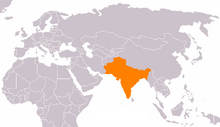सत्यमेव जयते ("Truth Alone Triumphs") | |||||
| Anthem | "Subh Sukh Chain" | ||||
| Capital | Dilli | ||||
| Largest city | Dilli | ||||
| Other cities | Prayag | ||||
| Language official |
Sanskrit | ||||
| others | Punjabi, Pashto | ||||
| Religion main |
Hinduism | ||||
| others | Buddhism, Sikhism, Jainism | ||||
| Demonym | Indian | ||||
| Government | Constitutional Democratic Empire | ||||
| Samrat | Shahu II | ||||
| Peshwa | Narendra Modi | ||||
| Area | 14,500,000 km² | ||||
| Population | 300 million | ||||
| Established | 1674 | ||||
| Organizations | United Nations | ||||
India, the Indian Empire or Hindustan, is a nation in South Asia. It is the only Hindu-majority nation in the world. India in this form was created when the peoples of Maharashtra gained their independence from the Turkic Mughals and slowly began to replace them. By 1760, the capital of the Mughals was captured and by 1800, the Marathas were the premier empire in South Asia.
History[]
India has had a long and varied history, but its current incarnation is the result of an Indian region, Maharashtra, gaining independence from the Mughals. This region would, by 1760, conquer the Mughal Empire's capital, Delhi, and would then start to conquer the Durrani Empire. The Marathas did so and annexed all of it except for the regions that spoke Persian. They discovered electricity in the early 1700s. In the early 1800s they built long distance interlinked railway lines and electrified it (they were the first to do so). The gauge they chose was 1676mm Broad Gauge. By 1850, all of South Asia was under Maratha control. By then, however, a movement known as Nativism grew and this would eventually cause the Marathas to forcibly convert the Muslims and Christians of India to Sikhism, Jainism, and Hinduism. This was highly successful, although cruel, and India would slowly protest for democracy. This campaign was boosted when a sitting member of the Emperor's Court, Mohandas Gandhi, started to advocate for democracy. This would lead to democracy being established, with the Peshwa being elected by the people. The first elected Peshwa was Gandhi, who won in a landslide. However, by 1914, World War I started. India, wary of Britain and France, two powers which had to be overcome for unification, stayed neutral but invaded Burma. But, Burma was granted independance in 1948. Indian troops assisted Britain in the reconquest of Hong Kong, Java, and Malaya and the Pacific front of WWII was over by Diwali 1944. This would help Gandhi's anti-colonialism marches. India remained an extremely rich state. The US became very friendly and made India their ally. India, also, became an ally of the US after WWII. This would be central in the Cold War. By the time it ended in 1996, the alliance was powerful. This would help the US in the War on Terror.


